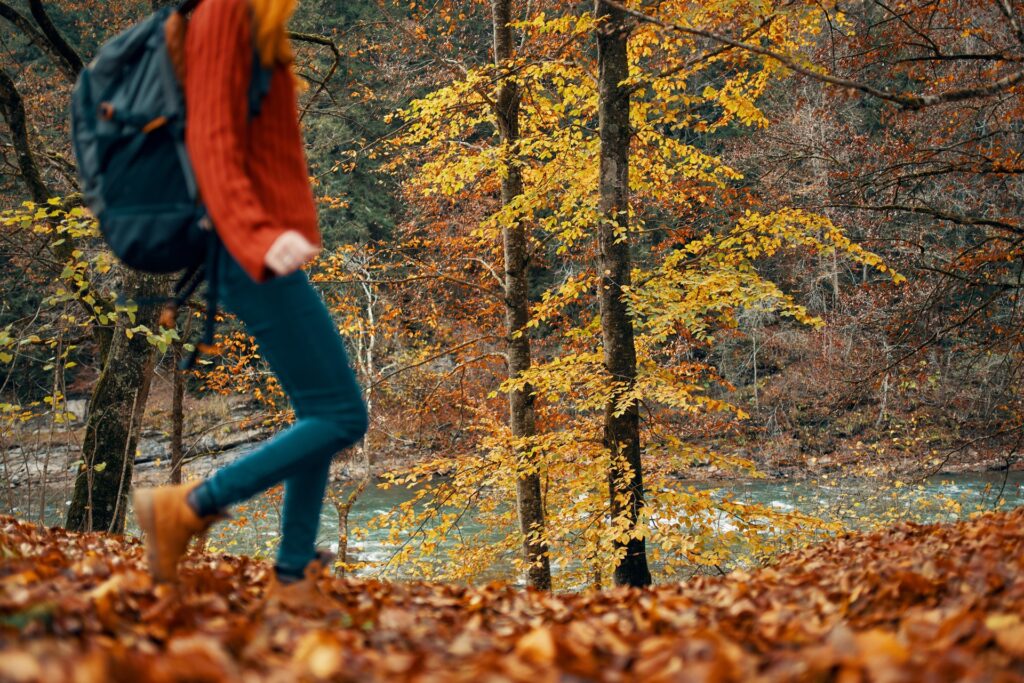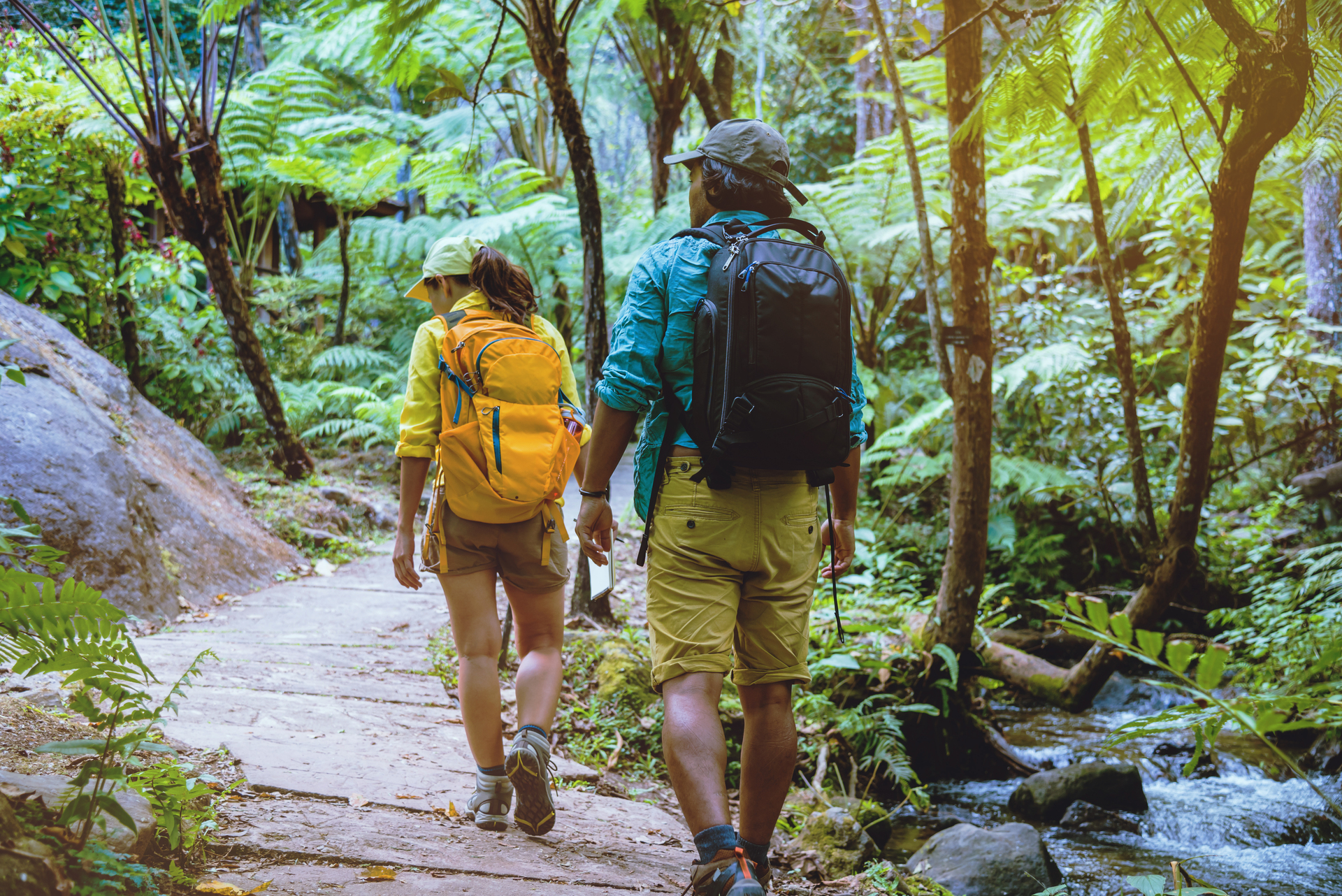Introduction
Nature walks, a simple yet profoundly enriching experience, invite us to step into the great outdoors and reconnect with the world around us. In this blog, we’ll dive into what a nature walk is, its numerous benefits, and provide practical suggestions for preparing and packing for your journey.

Understanding Nature Walks
Nature walks, an activity that beautifully blends simplicity and enrichment, typically involve strolling through natural environments such as forests, parks, or trails. These walks differ from hiking as they are less intense and not necessarily goal-oriented. Nature walks are about leisurely exploration, immersion in the surroundings, and enjoying the moment.
When on a nature walk, one can take the time to observe the small details often missed in everyday life, the sound of rustling leaves, the sight of a butterfly fluttering by, or the varied textures of the bark on different trees. It’s an opportunity to slow down, breathe deeply, and connect with nature at a pace that feels comfortable.
Nature walks can be solo adventures or shared experiences with friends and family. They provide a chance for quiet contemplation or engaging conversation, depending on your preference. Additionally, these walks are accessible to people of all ages and fitness levels, making them a universally enjoyable activity.
Importantly, nature walks are versatile. They can vary in length, difficulty, and scenery. You could take a short stroll around a local park, meander along a riverside trail, or wander through a dense forest. The choice depends on your location, interest, and the time you have available.
Overall, a nature walk is a journey of discovery and appreciation. It’s an invitation to step away from the hustle and bustle of daily life and embrace the tranquility and beauty of the natural world. Whether you’re seeking physical exercise, mental relaxation, or a deeper connection with the environment, a nature walk offers a pathway to these benefits and more.
Benefits of Nature Walks
Nature walks are not just a pleasant way to spend time outdoors; they offer a multitude of benefits that positively impact both physical and mental well-being. Let’s delve into these advantages in more detail:
- Physical Health Benefits:
- Improved Cardiovascular Health: Regular nature walks can enhance heart health by lowering blood pressure and reducing the risk of heart diseases.
- Increased Endurance and Strength: Walking, especially on uneven natural terrain, helps build muscle strength and stamina.
- Weight Management: Walking is an excellent low-impact exercise for burning calories and maintaining a healthy weight.
- Better Sleep: Physical activity in nature can lead to improved sleep patterns.
- Mental Well-being:
- Stress Reduction: Being in nature and engaging in physical activity are both known to decrease stress levels.
- Enhanced Mood: Nature walks can elevate mood and combat feelings of anxiety or depression.
- Improved Mental Clarity and Creativity: Spending time outdoors can enhance focus, clear the mind, and boost creativity.
- Increased Mindfulness: Walking in nature encourages a state of mindfulness, helping individuals to be more present and aware.
- Connection with Nature:
- Environmental Appreciation: Regular nature walks deepen our connection to and appreciation for the natural environment.
- Educational Opportunities: Observing different plants, animals, and ecosystems can be an educational experience for people of all ages.
- Promotes Conservation: A strong connection with nature often leads to a greater interest in environmental conservation and sustainable practices.
- Social and Emotional Benefits:
- Enhanced Social Connections: Nature walks can be a social activity, offering a chance to strengthen bonds with family and friends.
- Opportunity for Solitude: Conversely, they can also provide valuable alone time for personal reflection and peace.
Preparing for a Nature Walk
Essential Steps for Nature Walk Readiness
Proper preparation is key to ensuring a safe and enjoyable nature walk. Here are some steps to consider before embarking on your outdoor adventure:
- Choose the Right Trail:
- Research Trails: Look for trails that match your fitness level and interests. Consider the trail’s length, elevation gain, and terrain.
- Accessibility: Ensure the trail is accessible and open to the public. Check for any park fees or permits required.
- Check the Weather:
- Plan for the Conditions: Weather can change quickly, so be prepared for various conditions. Dress in layers to adjust to temperature changes.
- Sun and Rain Protection: Bring sunscreen, a hat, and sunglasses for sunny days, and a waterproof jacket or poncho for rain.
- Inform Someone:
- Share Your Plans: Always let someone know where you’re going and when you expect to return. This is crucial for safety, especially in remote areas.
- Pack Smart:
- Backpack Essentials: Choose a comfortable backpack and pack it with essentials like water, snacks, a map or GPS, a first-aid kit, and any personal items.
- Footwear: Wear sturdy, comfortable shoes or hiking boots suitable for the terrain.
- Know the Trail Etiquette:
- Respect Wildlife: Observe animals from a distance and do not feed them.
- Leave No Trace: Keep the environment clean by packing out all trash and staying on marked trails.
- Yield to Others: Be courteous to fellow trail users. Hikers going uphill generally have the right of way.
- Safety Considerations:
- Be Aware of Your Surroundings: Watch out for potential hazards like uneven terrain, slippery surfaces, and wildlife.
- Stay Hydrated and Nourished: Drink water regularly and have snacks to maintain energy levels.
- Timing Your Walk:
- Avoid Peak Times: If possible, choose times when the trail is less crowded for a more peaceful experience.
- Consider the Daylight: Ensure you have enough daylight for your entire walk, especially if you’re on a longer trail.
By following these preparation steps, you can set yourself up for a successful and enjoyable nature walk, making the most of the benefits that the great outdoors has to offer.
Packing Essentials for a Nature Walk
Gear Up: Must-Have Items for Your Nature Adventure
When packing for a nature walk, it’s important to have all the essentials to ensure a safe and comfortable experience. Here’s a detailed list of items to consider, each of which presents an opportunity to include affiliate links for recommended products:
- Appropriate Clothing:
- Layered Clothing: Dress in layers to easily adjust to changing temperatures. Include a moisture-wicking base layer, an insulating layer, and a waterproof outer layer.
- Sturdy Footwear: Choose comfortable, durable shoes or hiking boots with good traction, suitable for the terrain.
- Water and Snacks:
- Hydration: Carry a reusable water bottle or hydration pack to stay hydrated throughout the walk.
- Healthy Snacks: Pack energy-boosting snacks like trail mix, granola bars, or fruit.
- Navigation Tools:
- Map and Compass: Even if you plan to use a GPS device, having a physical map and compass as backups is a wise idea.
- GPS Device or App: A GPS device or a smartphone app can help keep you on track.
5.First Aid Kit:
- Basic Supplies: Include items like bandages, antiseptic wipes, blister treatment, and any personal medications.
6. Sun Protection:
- Sunscreen: A high SPF sunscreen is essential for protecting your skin.
- Sunglasses and Hat: Protect your eyes and face from the sun with UV-blocking sunglasses and a wide-brimmed hat.
Safety and Convenience: Extra Items for Peace of Mind
7. Weather Protection:
- Rain Gear: Pack a lightweight, waterproof jacket or poncho to stay dry in case of rain.
- Warm Accessories: For cooler weather, include gloves and a beanie.
8. Safety Items:
- Bear/Animal Pepper Spray: In areas with wildlife, carrying bear or animal pepper spray can provide peace of mind and protection.
- Whistle: A whistle is a simple, effective tool for signaling for help if needed.
9. Miscellaneous Essentials:
- Backpack: Choose a comfortable backpack with enough space for your gear.
- Camera or Smartphone: Capture the beauty of nature for memories or sharing.
- Insect Repellent: Protect yourself from bug bites with an effective insect repellent.
Conclusion
Nature walks offer a wonderful way to enjoy the outdoors, benefit your health, and find peace. By preparing appropriately and respecting nature, you can ensure a safe and enjoyable experience.







